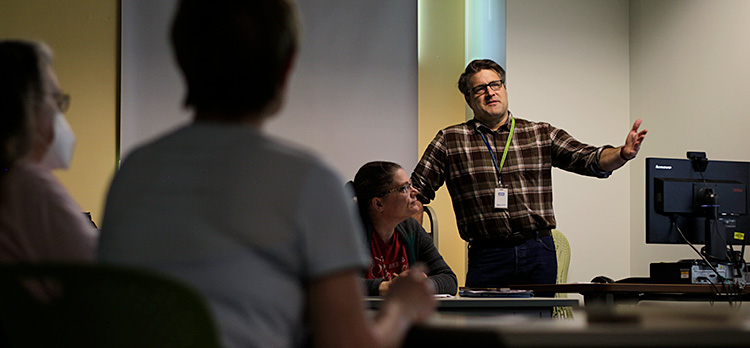The rapid development of artificial intelligence (AI) and the open source software platform ChatGPT are accelerating digital change throughout the world. It is difficult to keep pace with this technology, which has now become enmeshed in commerce, the arts and even the military.
The Daniel Boone Regional Library has recognized that the world of AI is not going away and will continue to become more complex. We also understand that, though these technologies are worrisome or confusing to some, they can create learning opportunities, too.
This is why we are offering several courses and workshops in using and understanding AI. The first of these was presented by professor J. Scott Christianson in a program co-sponsored by the library, the League of Women Voters, the Reynolds Journalism Institute, When She Votes and Race Onward: “Artificial Intelligence, the Elections and Civic Dialogue.” In this course, Christianson examined the potential impact that AI has on the information landscape and how that may more broadly effect our elections in the future.
One of the thorniest issues presented by AI is manipulated or manufactured images. For instance, photos of celebrities and important world figures can now be altered with AI platforms like DeepAI in a matter of seconds. In 2023, an image of Pope Francis in a puffer coat with sunglasses circulated on social media and looked so real that many legitimate news outlets published it. The possibilities for using these generated images nefariously are boundless.

There are ways to combat this, however. As professor Kathy Kiely pointed out in the first presentation in our “Before You Vote: How to Critically Analyze Your Digital Media Sources” media literacy series, using reverse image search is a great way to “fact-check” images that look suspicious. You can do this with Google or other sites such as TinEye. When it comes to protecting your own photos, new tools like those from Overlai are being developed to protect your social media images from being used by AI.
To further your understanding of AI, try one of two classes we’re offering this summer about the free AI platform and content generator ChatGPT. “Exploring ChatGPT” on July 24, will introduce the program and offer tips on its myriad uses. We’ll also discuss ChatGPT’s downsides, such as how it can be used to plagiarize texts and cheat on academic work and spread disinformation in social media.
ChatGPT has many uses that are legitimate. For instance, when establishing the framework or outline for a story or even a book, it can be very helpful. “Write Your Own Adventure WithChatGPT” on August 7 will explore how to create broad story outlines and generate ideas using the platform to enhance your creativity and give you a jumpstart on a writing project, which can be very daunting without an outline.”
TECH HELP AT THE LIBRARY
Keep your eye out for more programming related to AI and ChatGPT at the library!
You can see a full listing of classes in our calendar at dbrl.org/events or by picking up our “At Your Library” bimonthly program guide. All our classes are free.
We also welcome questions about the platforms and issues regarding artificial intelligence at our “Device Advice & Tech Help Drop-in” sessions in Columbia or “Tech Help Drop-in,” sessions in Fulton and Holts Summit.
Or we can help guide you in more detail with a “One-on-One Tech Help” appointment.
To register for a class or make an appointment, visit dbrl.org/tech-help.
